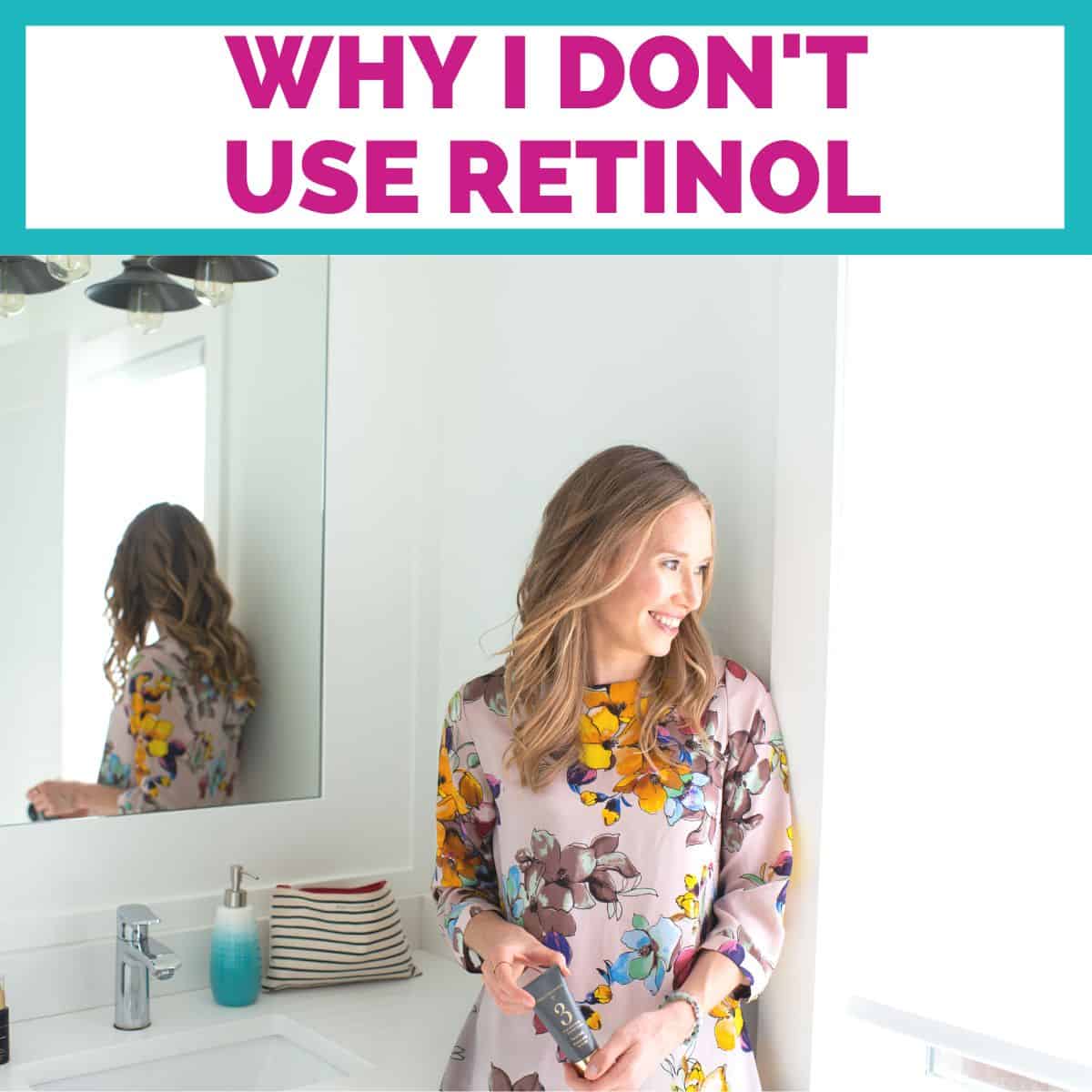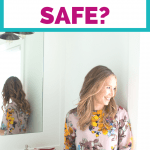This post reviews why I don't use retinol and the potential health risks of retinol. It is known that retinol is teratogenic and some evidence shows it can increase the risk of skin cancer.

Disclaimer: some of the links in this post are affiliate links where I make a small commission if you purchase the product through that link. This does not cost you anything extra and helps me keep this website running.
Is retinol safe?
Is retinol safe? I have been getting this question more and more lately. Ever since I started talking about the potential health risks of retinol and why I don't use it on Instagram I have been contacted by many of you. So I decided it was time to finally write a post about it to help you make your own decision as to whether you want to use it or not.
Truth be told, years ago I did use retinol on my skin. It was prescribed to me by my dermatologist to try and help with my acne. I didn't even think to question this recommendation back then. That was long before I started learning about the potential dangers of our personal care products.
However, once I did start learning about some of the harmful ingredients that can go into our skincare and beauty products I did a huge overhaul of all the products I was using on my skin and in my home to make them all as safe and as non-toxic as possible. And guess what, my acne improved way more than it ever did when I was actually using retinol! I know crazy right? I think a big part of it was getting rid of all those hormone and microbiome disrupting ingredients that I had been covering my skin with for years.
Before I go over the potential health risks of retinol I figured I better explain what retinol is.
What is retinol?
Retinol is a form of synthetic vitamin A. It is used in the skincare and cosmetics industry to exfoliate the skin, promote cellular turnover, heal acne and smooth fine lines and signs of aging. You can buy over the counter skin care products with retinol in them, or get products with a higher percentage of retinol with a prescription from your doctor.
Retinol comes in many different forms, including:
- Creams
- Gels.
- Lotions.
- Ointments.
- Serums.
Besides retinol, there are other synthetic vitamin A derivatives that are used in skincare products including retinoids, retinyl acetate, retinyl palmitate, all-trans retinoic acid, and tretinoin. Many people simply use the term retinol to refer to all of these types of ingredients (and that is the umbrella term I will use for the reminder of this article), but just note that the strength of the various vitamin A derivates does differ.
In recent years many people have started to question the safety of retinol, and in particular whether or not it can increase the risk of skin cancer. But besides the skin cancer risk, there are other issues with retinol so I want to discuss them.
Retinol is unsafe for pregnancy and breastfeeding
Retinol and synthetic vitamin A derivates are teratogenic. Meaning it is unsafe for pregnancy because it can cause fetal malformations and abnormalities. Especially in the first trimester, retinol is very dangerous, and can lead to spontaneous abortions and fetal malformations, including microcephaly (small heads), cardiac (heart) problems, and thymus abnormalities.
Because of these risks, it is recommended that you stop using retinol and other vitamin A derivatives (both internally and topically) if you are trying to become pregnant, are pregnant, or are breastfeeding.
Retinol is unsafe for use in the sun
Retinol has been shown to increase the sensitivity of the skin to sun, meaning that using retinol in the sun (especially without sunscreen) can make the skin more susceptible to sun damage, sun burns, and possibly skin cancer development.
A few studies have shown that using retinyl palmitate in the sun can cause an increased risk for skin cancer. Unfortunately, most of the studies directly examining this relationship have been done in animals, so it is hard to know if the same thing would happen in humans, but the fact that this risk has been shown at all is concerning.
Additionally, I don't think a study examining this relationship will ever be conducted in humans, because ethically it would likely not get approved so the animal data may be the best we will ever get. We already know that exposing people to the sun for long periods without sunscreen can increase their risk of skin cancer, so in order to do a study to see if retinol increases this risk even further we would have to knowingly put people in harms way, and I cannot see this type of study ever being approved by an ethics board.
One interesting caveat is that retinol is also used to treat certain types of skin cancer, so it would be really nice if more studies were done in this area so we could make more firm conclusions.
Retinol can be a skin irritant
Retinol can be very irritating to the skin and many different reactions can occur when it is used. In fact, mild-to-moderate skin reactions are among the most commonly reported side effects associated with the use of topical retinol.
Dermatitis, erythema (redness), scaling/dryness, peeling, burning or stinging, and irritation of the skin are common adverse reactions reported with retinol use, and, in some cases, the reactions are so bad, that even at low concentrations it cannot be used by certain people.
Alternatives to retinol
Maybe after reading this post you too want to stop using retinol or are curious to learn about alternative options to retinol. Maybe you're nervous about the potential skin cancer risk, can't tolerate it due to skin irritation, or are thinking of getting pregnant or breast feeding and want to start avoiding this ingredient. But I also understand that retinol is very hard to give up because it is just so darn effective.
Well there's good news. There is another ingredient that has been shown to provide the same anti-aging and skin improving benefits as retinol without the same potential risks. This ingredient is called bakuchiol.
Bakuchiol comes from the seeds of the plant Psoralea corylifolia which grows in India and Sri Lanka.
Not only has bakuchiol been shown to offer similar anti-aging effects as retinol, it has also been shown to have additional benefits such as having high antiboxidant acuity and helping with wound healing.
What's even more interesting, is that bakuchiol has also been shown to have anti-cancer, anti-microbial, anti-fungal, anti-oxidant effects and is effective in treating acne. In other words, it's one powerful ingredient!
Of note there is one reported case of someone who did experience an allergic reaction to a product containing Bakuchiol, so when you do start any new skincare product I always recommend spot testing first, since like anything, there is always the potential for someone to be allergic to a new ingredient.
How to stop using retinol safely
If you do want to stop using your current retinol products please don't just stop them cold turkey. Well you can, but just be warned that your skin will likely have some pretty extreme reactions initially. Retinol impacts the skin in many ways, and when you stop it your skin basically has to re-learn how to balance itself again.
When people stop using retinol it is common to experience an increase in acne or skin dryness for a few weeks afterwards. I definitely did. I made the mistake of just stopping retinol abruptly and my acne went crazy! It was terrible! The worst it has ever been. And it lasted for about two months. But after that it did get better again but those first couple months were pretty tough.
Now I always recommend that people wean themselves off retinol and decrease using it slowly. For example, if you are using it twice a day, go down to once a day for a week or two, then every second day for a week or two, etc. That way any kind of reaction that you have should be less extreme.
The products I use with Bakuchiol
If you're interested, I use a few different products with Bakuchiol, and I love the results I have seen in my own skin since starting them. I have dry, acne prone skin and Bakuchiol and I seem to be made for each other, but these products are great for most skin types. I'm currently use a couple different products that contain Bakuchiol including:
- Beautycounter Mineral Boost Hydrating Essence (I use this before my face cream - it helps lock in moisture and provides the skin with a nice, dewy glow).
- Beautycounter Ultra Renewal Eye Cream (I use this eye cream both morning and night). I also love using this cream on my forehead and the corners of my mouth as I find it really helpful for reducing fine lines and wrinkles.
Take away points:
- Retinol is teratogenic so it is unsafe if you are pregnant or breast feeding. If you are a women of child bearing age who is trying to get pregnant or not actively using contraception to avoid getting pregnant you should avoid retinol or vitamin A.
- If you do use retinol, don't use it if you are going to be exposed to the sun.
- There are other ingredients such as bakuchiol that are just as effective as retinol without the potential health concerns.
- As always you need to decide what's best for you. If you are unsure whether you want to use retinol or not I suggest discussing it with a board certified dermatologist who is interested in integrative medicine, environmental toxicity, and holistic medicine to get the best advice.
I hope you found this helpful! If you do have any questions please let me know! I have also included a list of references that I used to help write this article below.


Joanne
Thank you for this very informative article. A few years back I tried Retinol and it left my sensitive skin feeling dry. So I begin using Cerave and it works great! Also, I like using Tula products and a vitamin C serum from time to time.
Erin Carter
So glad you found it helpful Joanne!
Tania
One of the papers you cite supports that retinol reduces the risk of skin cancer.
Erin Carter
Hi Tania!
Yes that is a study looking at the use or oral retinol so it's not really relevant to my post which is about topical retinol but I thought it was important to put in as a reference so people are aware of the difference between taking retinol internally vs using it externally. Thanks for reading!
Pearl
Wow- I had no idea! Have used retinol for years. I'm done with that then, thank you! Also, where did you get that dress you're wearing in the picture above? It's beautiful, and especially beautiful on you!
Erin Carter
So sorry for the delayed response Pearl! I am so glad you found it helpful. And it's actually a shirt that I got a long time ago at The Limited (before they went out of business). Thanks so much for following!